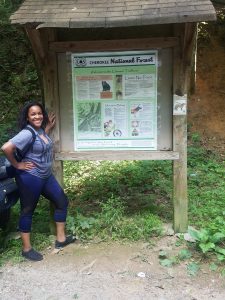Competency One: Demonstrate ethical and professional behavior
Introduction: The Council on Social Work Education (CSWE) states that an advanced practitioner should demonstrate ethical and professional behavior. One demonstrates this competency by ensuring their practice is evidence-based, the ethical values of Social Work are followed, ensuring they are knowledgeable of current policies that might impact their work, and communicating effectively.
1.1 – Develop a practice framework for analysis of complex environments that is ethical, value-grounded, and evidence-based
Course Evidence: Completed a Reflection Paper on Social Work and Christian Faith to assess how personal bias, assumptions, and stereotypical beliefs can influence our practice as believers. When working with an agency or client whose belief system is different or dealing with a controversial subject matter that we have strong convictions about, the first duty of a practitioner is responsibility to be committed to the client. We navigate these situations professionally, respectfully, and in a non-judgmental manner.
Field Evidence: Ensuring I follow the NASW Code of Ethics when teaching students and interacting with co-workers. The Code of Ethics will be a guide to help me when I find myself in complex environments or dealing with complex situations; making sure I remain professional in actions and words while I navigate what is going on. An example of being a Social Worker would be to inform school personnel of my role because they are not thinking from the same perspective or may not be aware of my responsibilities.
Additional Evidence: This was demonstrated throughout the fall and winter semesters with group projects for Advanced Administrative. As a group we decided at the start how we would resolve conflicts should they arise, preferable method of communication, and how to delegate tasks. Due to having a conversation beforehand we were able to implement our plan when needed to ensure everyone’s voice was heard. Communication Plan
1.2 – Implement supervisory and self-care strategies that integrate professional strengths, limitations, and challenge
Course Evidence: Advanced Practicum we discussed different ways to practice self-care and those experiences are noted in our weekly field journals. Also discussed the importance of self-care, which is to ensure that we take care of our personal needs and well-being so that we can work with our clients without hinderance. Self Care Journal Entries
Field Evidence: Weekly supervision phone conferences with my field instructor to discuss application of course content in field placement and overall experience. Bi-weekly (or as needed) meetings with my task supervisors to discuss progress and further engagement with the agency to utilize social work skills.
Additional Evidence: Self-care practice/routine for me during the school year were twenty minute evening walks, adult stress-relieving coloring, and visiting family on the weekend.
1.3 – Exhibit commitment to professional growth through continuing education, supervision, and ongoing consultation
Course Evidence: Compiled a list of twenty-one questions to ask a current and former School Social Worker via phone interview. This was done so I could gain more insight about responsibilities of a School Social Worker, issues students are facing, self-care practice to prevent burnout, and any advice from their experiences. I learned a lot more than I expected during my discussion with these women, that informed and further excited me about the career.
Field Evidence: My supervisor is a certified trainer for Darkness to Light: Stewards of Children, which is an evidence-based prevention training program that teaches the public and professionals how to recognize, respond to, and report child sexual abuse. I attended a training session to gain more formal knowledge about child sexual abuse prevention, and update my Stewards of Children Certificate.
Additional Evidence: The curriculum used by the Children’s Advocacy Center to give the body boundaries safety lesson to Elementary aged students is evidence-based and is called Lauren’s Kids: Safer, Smarter Kids. As an advanced Social Work practitioner I plan to participate in the online training sessions to that I can be a certified facilitator and give the Lauren’s Kids presentations. I reached out to the company and inquired about the process for obtaining learning materials.
1.4 – Demonstrate professional oral and written communication skills
Course Evidence: Advanced Clinical Practice we made videos over the course of the school year of our interviewing skills with pseudo clients for individual and group therapeutic sessions. After a week of practice we submitted our videos to our cohort leader, who provided Feedback Notes. Watching the videos and making corrections on how I would interview differently allowed me to evaluate the effectiveness of my verbal communication and CBT skills.
Field Evidence: Written communication was demonstrated by documenting notes from therapy sessions in software Therasoft for the Austin Hatcher Foundation. Oral communication was demonstrated when co-facilitating a parent group session about Quality Family Time, which received positive feedback from my supervisor for engaging group participants and “reading the room,” i.e., being able to assess the tone of the group.
Additional Evidence: Professional oral communication was demonstrated when teaching the Safer, Smarter Kids lesson at various Elementary Schools in Hamilton County Chattanooga, TN. I had to ensure that for each grade level I discussed content in a way that the students understood and examples were relatable.

